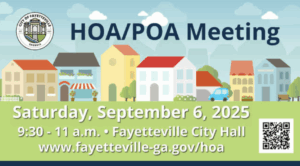To educate residents about the proposed two-year “core infrastructure” stormwater sales tax vote coming in November, county officials late last week released details about the county’s stormwater plans in a question-and-answer format.
In that information, the county defends the need to repair three dams on privately-owned lakes which have structural deficiencies that, if unrepaired, could lead to a breach that would endanger properties downstream.
The three dam projects are the largest-cost items on the lists, as the Longview Dam comes in at an estimate of $1.21 million, the Emerald Lake Dam has an estimate of $1.1 million and the Kozisek Dam has an estimated cost of $250,000.
According to the Q&A from the county, the Longview Dam project is located in the right of way of Longview Road and is contingent on the upstream lake being deeded to the county “for use as a passive park and/or environmentally protected area.” The Emerald Lake Dam is within county right of way and the county also accepted ownership and maintenance responsibility for it in 1998, officials said.
The Kozisek Dam is located on Neely Road and the county expects to pay the $250,000 for its share of removing the dam and rebuilding the road. The other two dam projects, however, will result in keeping the lakes maintained via dam repairs required by state officials.
The Fayette County Commission plans to use its $16.8 million share of the sales tax to fund stormwater improvement projects located exclusively in unincorporated Fayette. The commission plans to adopt a stormwater project list at a special called meeting Sept. 5 at 7 p.m.
Meanwhile, Peachtree City plans to dedicate its sales tax revenue to street and cart path maintenance over a number of years and the City of Fayetteville is working on its proposed list of projects eligible for sales tax funding.
If the 1 percent sales tax is approved, it would be implemented countywide for two years.
Beyond the dam improvement projects, the county plans to use sales tax proceeds for replacement of drainage pipes that run underneath county roads that have reached the end of their useful life. Some of those pipes can threaten the integrity of the road as damage to corrugated metal can result in the road collapsing, necessitating emergency repairs, officials have said.
The county is currently replacing failed metal corrugated pipe with reinforced concrete pipe because it “often offers the best combination of longevity, cost, low risk and water quality enhancement.”
The county does have the flexibility to use other ways to replace stormwater pipe.
The sales tax proceeds would also be used to purchase a “jet trailer” that will help remove mud, leaves, gravel and other debris from manholes, catch basins, culverts and similar structures, along with a dump truck, trailer and mini excavator used for small pipe replacement and minor grading work. The road department’s other equipment is generally too large to use in such applications, officials said.
In the Q&A document, the county explains why it needs to repair stormwater pipes “that seem to be functioning correctly.”
The pipes’ conditions have been rated, and they have been targeted for replacement if:
• The pipe is in poor condition
• The pipe is undersized and contributes to flooding issues;
• The pipe is too short and presents a safety issue for vehicles;
• The pipe is a corrugated metal pipe running under a collector or arterial road and shows signs of exterior and/or structural deterioration; and
• The pipe is in “fair” condition today but structural deterioration has been documented.
The various stormwater projects have been prioritized with “category I” projects aimed at immediate implementation to prevent the possibility of loss of human life and/or property, while others have a “category II/tier 1” status with repairs made within two years. Those designated “category II/tier 2” and “category III” projects will be implemented between three and five years.
In addition to using expertise from the county’s engineering, road and environmental management departments, the county will also use consultants and third-party contractors for work beyond the road department’s capabilities or for scheduling reasons, officials noted in the sales tax Q&A.
The county has created a special email address to handle citizen questions about the sales tax. Citizens can send such inquiries to [email protected].
The idea of using a sales tax to fund the county’s stormwater projects was the result of three town hall forums the commissioners hosted to hear citizen grievances about the assessment of a new stormwater fee on all property located in unincorporated Fayette County. A number of residents at those meetings contended they wanted city residents to pay for the stormwater projects since those residents also use county roads.
If the sales tax is not approved by county voters this November, the county will have to find another way to fund stormwater repairs and Peachtree City will have to find money for street and cart path repairs in future budget years, with the possibility of a voter-approved general obligation bond or a millage rate increase.
If the sales tax is approved, however, the county will not assess stormwater fees for the following four years, as officials have committed to cutting that break to property owners in unincorporated Fayette.










Leave a Comment
You must be logged in to post a comment.